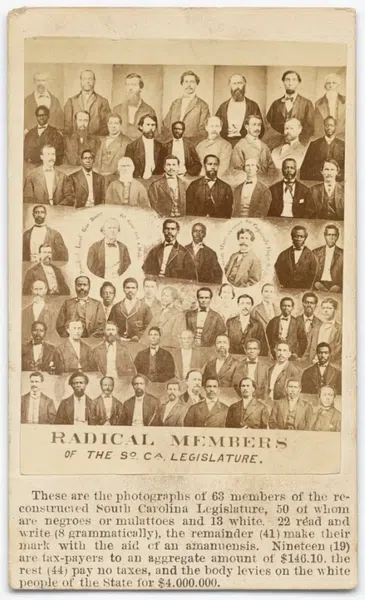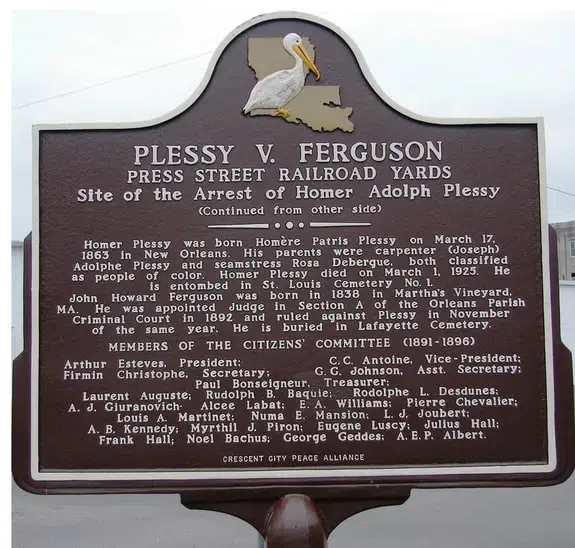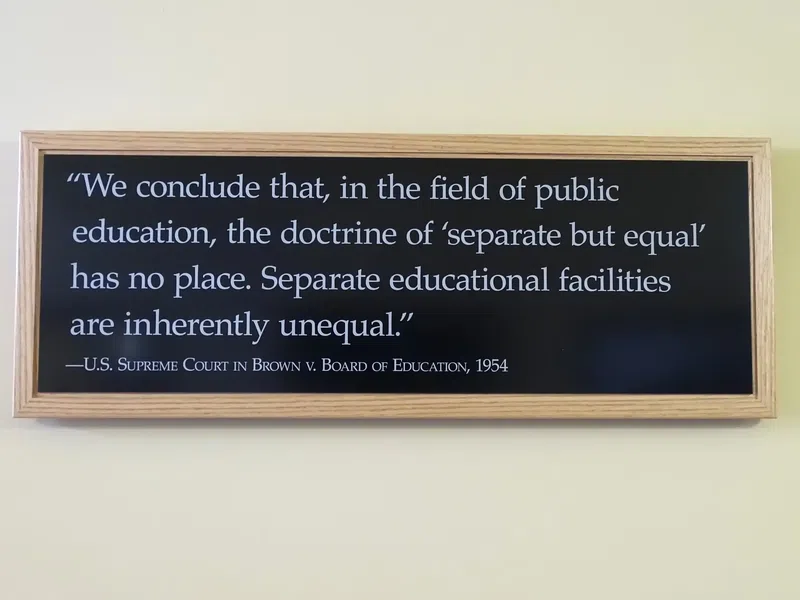 Congress-14th Amendment 2nd Section Source: Wikimedia Commons
Congress-14th Amendment 2nd Section Source: Wikimedia Commons
14th Amendment to the Constitution
After the Civil War, Reconstruction became necessary to mend the war-torn country. The South, hit the hardest both economically and physically, grasped for power after the 13th Amendment freed the African American labor force. Unfortunately, the South immediately introduced and passed laws that kept African Americans disenfranchised and without a political voice. Known as one of the Reconstruction Amendments, the 14th Amendment passed by Congress in 1866 attempted to give African Americans rights.
Reconstruction- the period after the Civil War from 1855-1877 where the United States struggled with the reintegration of southern states back into the Union

Radical Republicans
of the South Carolina Legislature. Source: Wikimedia Commons
Ratification of the 14th Amendment
Ratification of the 14th Amendment caused much controversy at first, especially in the southern states where Congress coerced its ratification in exchange for re-entry back into the Union. Therefore, many in the South claimed the amendment to be invalid. Though many disapproved of the amendment's validity, Ohio and New Jersey ratified the amendment, along with Alabama and Georgia. After Alabama and Georgia's ratification, Secretary of State William Seward verified the amendment on July 28. While the amendment became an official part of the Constitution, many Southerners continued to argue its' viability. As time continued, all prior confederate states ratified the amendment ending the argument.
Ratification- the act of giving formal consent to a treaty
 John Bingham, author of the first section of the 14th Amendment Source: Wikimedia Commons
John Bingham, author of the first section of the 14th Amendment Source: Wikimedia Commons
The 14th Amendment in Simplest Terms
Though the Civil War fought to constitutionalize equal rights, many Southerners immediately passed legislation restricting African Americans' rights to regain control and power. In response, Congress passed the 14th Amendment to curtail the South's attempts to disenfranchise black southerners. In addition, the amendment states that every born or naturalized person is guaranteed citizenship. However, this did not include Native Americans based on the idea that they fell under tribal laws. Eventually, in 1924 Congress moved to have Native Americans within the amendments' rights.
At the amendments' core lay three distinct clauses that explain the purpose and intent of the fourteenth amendment.
- Privileges and immunities clause
- Due Process Clause
- Equal Protection Clause
Disenfranchise: depriving someone of a right or privilege
Purpose of the 14th Amendment
 Extract from the Reconstructed Constitution of the State of Louisiana. Source: Wikimedia Commons
Extract from the Reconstructed Constitution of the State of Louisiana. Source: Wikimedia Commons
Section one of the amendment outlines the main provisions of the amendment, declaring that all states must give all citizens equal protection under the law and access to due process.
Section one of the amendment states:
“No state shall make or enforce any law which shall abridge the privileges or immunities of citizens of the United States; nor shall any state deprive any person of life, liberty, or property without due process of law.”
Constitution of the United States
Amendment XIV
Section two of the amendment focuses on correcting the 3/5th’s compromise that had stated African Americans only counted for 3/5ths of a person for representation purposes. However, section two states that all Americans, except for Native Americans, are counted towards full representation.
3/5ths compromise- three-fifths of the slave population would be counted for representation in the House of Representatives
Section three includes action against former confederate leaders, prohibiting them from serving in critical political roles.
 Constitutional Convention. Source: Wikimedia Commons.
Constitutional Convention. Source: Wikimedia Commons.
Sections two through four illuminate the country's state at the amendment's adoption. Each of the three middle clauses notes something of rebellion or insurrection. For example, section two states "except for participation in rebellion or other crime," Section three "shall have engaged in insurrection or rebellion against the same, or given aid or comfort to the enemies," and section four "including debts incurred for payment and bounties for services in suppressing insurrection or rebellion." While the amendment's language does not directly name the Civil War, it alludes to the overall goal of the amendment, to repair and reconstruct the damage caused by the war.
Section 5 of the 14th Amendment
 US Senate and House of Representatives Votes on the 14th Amendment. Source: Edward McPherson, LLD, 1866, Wikimedia Commons
US Senate and House of Representatives Votes on the 14th Amendment. Source: Edward McPherson, LLD, 1866, Wikimedia Commons
Whatever legislation is appropriate, that is, adapted to carry out the objects the amendments have in view, whatever tends to enforce submission to the prohibitions they contain, and to secure to all persons the enjoyment of perfect equality of civil rights and the equal protection of the laws against State denial or invasion, if not prohibited, is brought within the domain of congressional power. -Section Five, 14th Amendment, 1868
Section five of the 14th Amendment outlines the power of enforcement Congress needed to implement the amendment's provisions. However, in 1879 the Supreme Court acknowledged the power of Congress and allowed it to have greater authority. Many debated giving Congress so much power, and it became strongly criticized. However, today, Congress' rule is not permitted to regulate the conduct of citizens, that power is reserved for state governments.
Plessy v Ferguson 1896

Back Side of Plessy v Ferguson marker. Source: Skywriter
CC-BY-SA-3.0
Wikimedia Commons
It took almost thirty years until the provisions of the 14th Amendment came into question in the court case of Plessy v Ferguson. In 1892, African American passenger, Homer Plessy, refused to sit in a designated train car for blacks only. The train car incident had violated Plessy's constitutional rights. The Supreme Court upheld "separate but equal" facilities arguing that the 14th Amendment did not guarantee social protections. Thus, the ruling in Plessy v Ferguson indirectly constitutionalized Jim Crow in the South, leading to decades of legal, racial segregation.
Jim Crow- A set of laws allowing a state to enforce legal segregation
Brown v Board of Education 1954

Quote on Segregation from Supreme Court Decision. Source: Adam Jones
CC-BY-SA-2.0
Wikimedia Commons
In following the "separate but equal" doctrine, many school systems used this to segregate schools legally. The National Association for the Advancement of Colored People (NAACP) began to desegregate schools throughout different states. In Topeka, Kansas, African American parents, encouraged by the NAACP, enrolled students in all-white schools. With the enrollments refused, the NAACP used Oliver Brown's daughter as an example and filed a lawsuit. Due to refusal of enrollment, Brown's daughter enrolled in a school far from her home. As a result, the NAACP argued that racial segregation directly assaulted provisions made in the 14th Amendment.
At first, the Supreme Court ruled against Brown in 1951, stating that both white and black schools were indeed equal. However, after the NAACP appealed the ruling, the Supreme Court took four years to rule racial segregation in schools illegal. Finally, Chief Justice Earl Warren stated several intangible inequalities could be seen between the white and black schools, especially among older students. In response, an order came down to take action to integrate the schools.
National Association for the Advancement of Colored People (NAACP)- Civil Rights organization founded in 1909 to advance the expansion of African American rights
The 14th Amendment - Key takeaways
- Congress passed the 14th Amendment in 1866, and its' purpose was to give citizenship to African Americans.
- Though the 14th Amendment guaranteed citizenship rights for African Americans, it did not extend the same rights to Native Americans.
- Section 5 of the 14th Amendment gave Congress power to implement the Amendment.
- Providing this kind of power to Congress was highly criticized
- Today, Congress is not allowed to regulate citizens' conduct of citizens only state governments can do that
- In Plessy v Ferguson Congress ruled that separate but equal was constitutional essentially legalizing Jim Crow laws in the South leading to decades of legal, racial segregation.















